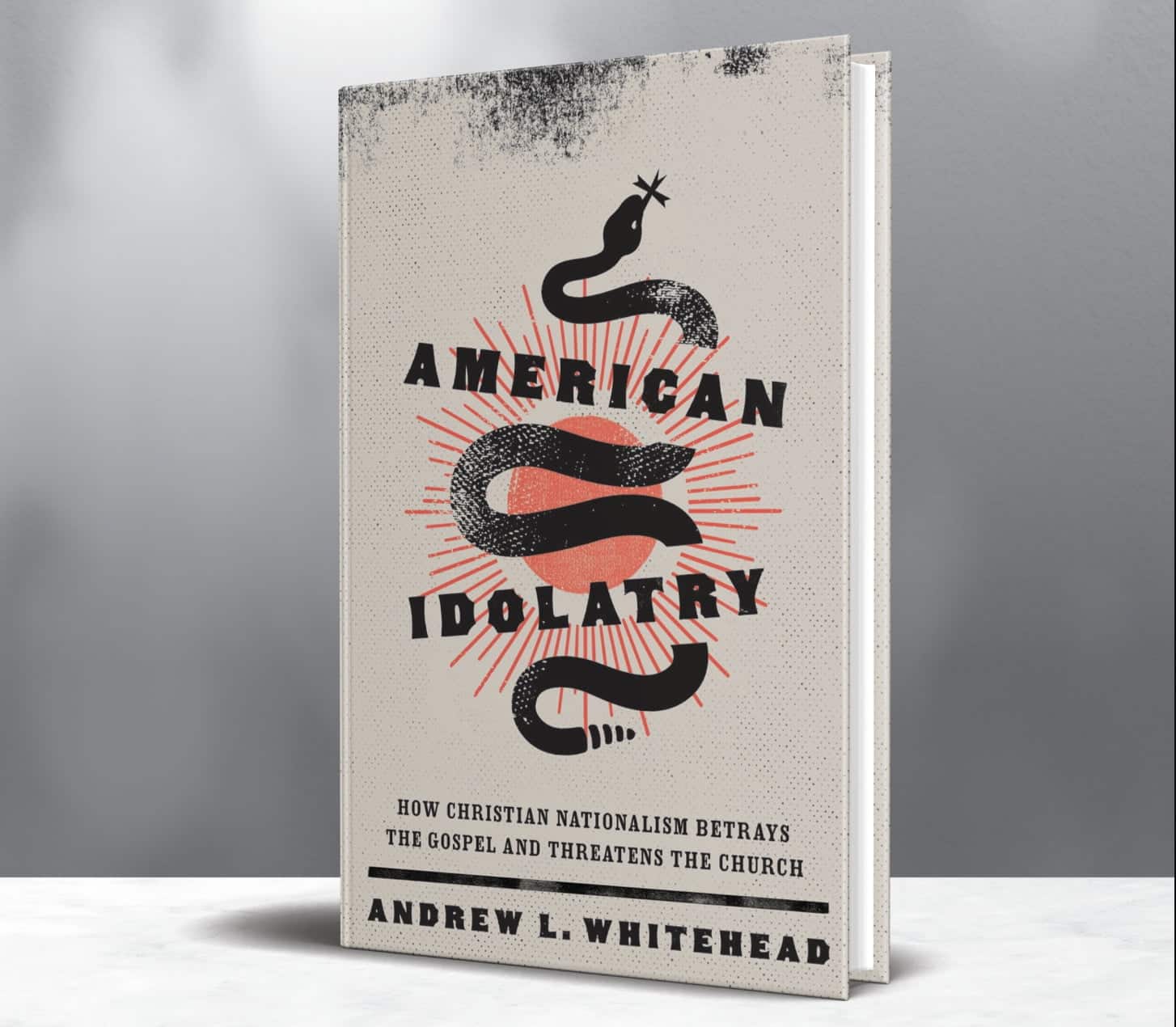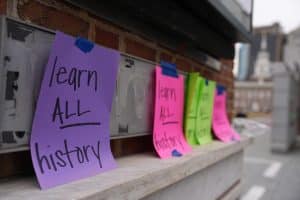This week, I’m sharing a conversation with my friend Andrew Whitehead, who helps us understand the MAGA movement, the insurrection on January 6, and their disturbing religious underpinnings. His important new book, American Idolatry: How Christian Nationalism Betrays the Gospel and Threatens the Church, will be published Aug. 15. I had the privilege of reading an advance copy of the book, and strongly recommend it.
Q: Andrew, you describe coming to a disturbing revelation in this book. What was it?
WHITEHEAD: If your experience growing up in primarily white, Christian spaces was anything like mine, we heard repeated warnings concerning what was going to destroy Christianity and the United States — secularism, Democrats, feminism, divorce, homosexuality or non-Christian faiths. Each was commonly mentioned, among other threats.
Particularly in election years we were encouraged to “vote our values” and ensure God’s blessing on the United States by placing the right people in positions of power to turn our nation back to God. Many well-meaning and earnest Christians, like myself, fell in line and did what we felt we had to do in order to be faithful Christians and good Americans.
But what if the greatest danger to the witness of Christianity in the United States wasn’t any of these or another outside threat? What if the greatest danger looked so familiar it was able to evade detection? What if the greatest threat to Christianity in the United States was white Christian nationalism?
After years of examining Christian nationalism as a social scientist, leading to my first book with Sam Perry — Taking America Back for God: Christian Nationalism in the United States — I’ve become convinced the greatest threat to Christianity in the U.S. is white Christian nationalism. Over and over, we find evidence that the practical fruit of Christian nationalism is not love. It is power, control, domination, fear and violence.
Christian nationalism makes American Christians less Christ-like.
It was this realization that motivated me to write American Idolatry: How Christian Nationalism Betrays the Gospel and Threatens the Church. In American Idolatry I weave together my professional and personal journeys to explore why and how American Christians should confront white Christian nationalism. I show how it betrays the gospel and actively impedes Christians from participating in the work of the kingdom of God, seeking the good of those around us.
Q: OK, that’s a jaw-dropping, disturbing claim. How do you make the case for this argument, especially when some of what you’re describing has become a familiar part of many churches, especially conservative white churches?
WHITEHEAD: In the book, I provide an empirically supported definition of white Christian nationalism — a cultural framework that idealizes and advocates for a fusion of a particular expression of Christianity with American civic life — and a “field guide” for recognizing Christian nationalism out in “the wild.” I discuss flags in sanctuaries, Fourth of July “Celebrate America” services and several other important signals. I also highlight five basic facts every American should know about Christian nationalism.
Q: The title of the book is American Idolatry. What do you mean by the word “idolatry”?
WHITEHEAD: Central to this book are the three main idols of Christian nationalism: Power, fear and violence. I show how each idol continues to tempt American Christians and how Christians’ embrace of each idol results in harm toward our neighbors, ourselves and our nation.
Power is the ability to get others to do what you want, despite their resistance. Wielding power to serve one’s own group is tempting. Especially when it is contrasted with the political realities of living in a pluralistic, democratic society where collaboration and compromise are vital. But when it comes down to democracy or power, white Christian nationalism chooses power every time.
In American Idolatry I write how “the final goal of Christian nationalism is a United States where white, culturally and religiously conservative, natural-born citizens occupy the unquestioned center of the culture and enjoy privileged access to interpersonal, organizational and institutional control” and is “not interested in a government for the people by the people, but rather for a particular people, by a particular people.” Christian nationalism weakens the church by demanding it seek earthly, self-interested power, rather than seeking to support and serve the marginalized.
READ: Pennsylvania’s Prayer Warrior: Abby Abildness And Her Dominionist Crusade In The Commonwealth
Fear and a sense of threat, particularly concerning the loss of privileged access to power in service of protecting one’s own group at the expense of others, is the second idol of Christian nationalism. Christians in America have a long history of succumbing to fearmongering toward perceived out-groups. I explore how Christian nationalism weakens the church by constantly stirring up fears of others, rather than encouraging peacemaking, hope and love.
The final idol of Christian nationalism, violence, is intimately intertwined with worshipping power and demonizing out-groups through fear. When we are constantly stoking the fires of fear and threat because “they” are out to steal “our” rightful power, violence is a natural result. A comfort with interpersonal and institutional violence is endemic to Christian nationalism. Ultimately, the use of violence signals a distrust of the work of God in the world and seeing the image of God in all people. This weakens the church by building up dividing walls of hostility, rather than breaking them down.
Q: How does all this connect to white supremacy and racism? After all, the problem we’re talking about is an overwhelmingly white Christian phenomenon.
WHITEHEAD: The final two chapters of American Idolatry explore how these three idols — power, fear, violence — conceal the reality and harm of racism and xenophobia. I show how Christian nationalism weakens the church and threatens democracy by blinding us to the cries of those speaking out against social inequality.
As I write in the book, “White Christian nationalism obscures the structural and systemic causes of racial inequality in service of upholding a narrative that the United States has a special relationship with the Christian God.” What use do white American Christians have for overturning systems of oppression, when we have long benefitted from those very systems?
READ: Why Americans Shouldn’t Dismiss Shiny Happy People’s Warning Of A Christian-Controlled Nation
My goal for this book is to thoroughly examine and document the empirical evidence social science provides us concerning Christian nationalism so we can all — whether Christian or not — recognize how Christian nationalism betrays fuller expressions of the Christian gospel and only leads to harm for our neighbors.
Q: Andrew, this is such a challenging topic, written in troubling times. Where are you finding hope?
WHITEHEAD: While this book is the result of my professional journey studying Christian nationalism, it is also deeply personal. I have long wrestled with the implications of Christian nationalism for my Christian faith. I reflect on how power, fear and violence were a natural part of my religious experiences over the years.
Throughout the book I provide examples of people moving toward expressions of Christianity that confront and oppose Christian nationalism and lead to the flourishing of all. These are people defending true religious liberty, taking reparative steps toward racial justice, and exhibiting true neighborliness and welcome to refugees coming to their communities.
It’s these stories that ultimately give me hope. It’s these people who are showing us the way forward. They believe in and are busy establishing a future where all people can flourish — not just the chosen few.
It is time for the American church to regain its prophetic voice and no longer make itself a servant to the nation’s interest rather than the kingdom of God. Empire is not at the center of God’s story.
I believe American Christians are starting to take seriously the threat of Christian nationalism to their faith and American democracy. I hope others will join me on this journey. There isn’t a moment to lose.
This article was originally published at Baptist Global News, a reader-supported, independent news organization providing original and curated news, opinion and analysis about matters of faith. You can sign up for their newsletter here. Republished with permission.






